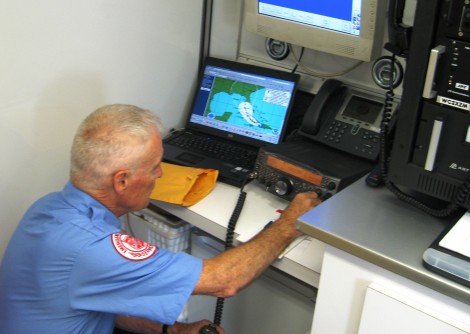When All Other Communications Fail, Try SATERN ...
Bill Feist | bill_feist@uss.salvationarmy.org

Photo: SATERN volunteer Pete Tiffany (KT4BW) at the amateur radio operating station in the Salvation Army's Satellite Communications (SATCOM) Trailer.
It is Saturday, September 1, 2012.
Hurricane Nasty – a Category 3 hurricane - has grown in the Gulf of Mexico like a malignant tumor and has made landfall near Pensacola, FL. It has moved across the western panhandle of Florida. It is now moving across Alabama, destroying homes and businesses and disrupting lives, transportation routes, power and communications where ever it goes.
Cell phone and radio towers and telephone / power poles fall like harvested wheat. First responders either have no communications or only short-range communications within their communities. Except for the few agencies that have expensive satellite-based communications, telephone and internet services are non-existent. Because of the extent of the damage and the difficulty in opening up roads, telephone, cell phone and internet providers report that it will be several days before any kind of reliable communications can be re-established.
It is this kind of scenario that the Salvation Army Team Emergency Radio Network (SATERN) trains for all year. SATERN is a group of Salvation Army Emergency Disaster Services (EDS) volunteers with amateur radio licenses that specialize in providing emergency communications. SATERN operators are adept at quickly establishing emergency communications for The Salvation Army. Because SATERN operators own their own equipment, they have easy access to what they need. There is very little communications infrastructure involved so SATERN operators can be back “on-the-air” quickly. And SATERN operators train for these kinds of situations frequently. They participate in daily and weekly “nets” (on-air gatherings of SATERN or other amateur radio operators). They attend trainings at local amateur radio club meetings. And they participate in annual exercises.
SATERN operators can provide short-range communications for The Salvation Army within their own local communities. They can provide longer-range communications between the local Corps or Service Center and Divisional Headquarters. They can provide Salvation Army command posts and disaster site operations with modern digital communications. Some of the digital communications can be provided through new amateur radio modes. SATERN operators can also be an important member of the teams that deploy the Southern Territory’s new satellite-based communications systems including a Satellite / Radio Communications Trailer and three smaller Satellite Technical Packages.
However, for many families that have been affected by a major disaster, the most important service SATERN provides is “Health & Welfare” messages. Health & Welfare messages allow individuals and families to tell family members outside of the disaster-affected community about their status after the storm. They can tell their families that everyone is OK. Where they are staying. How they can be reached when communications return. After Hurricane Katrina, SATERN delivered over 25,000 such messages throughout the United States.
Amateur radio operators who are interested in becoming members of SATERN should register as an EDS and SATERN volunteer through this web-site by clicking the SATERN link under the ABOUT tab at the top of this page. The registration will be automatically forwarded to the Territorial SATERN Coordinator who will see that they are registered with the Territory and with their Division and local Salvation Army unit.
About The Salvation ArmyThe Salvation Army annually helps more than 30 million Americans overcome poverty, addiction, and economic hardships through a range of social services. By providing food for the hungry, emergency relief for disaster survivors, rehabilitation for those suffering from drug and alcohol abuse, and clothing and shelter for people in need, The Salvation Army is doing the most good at 7,600 centers of operation around the country. In the first-ever listing of “America’s Favorite Charities” by The Chronicle of Philanthropy, The Salvation Army ranked as the country’s largest privately funded, direct-service nonprofit. For more information, visit www.SalvationArmyUSA.org. Follow us on Twitter @SalvationArmyUS and #DoingTheMostGood.